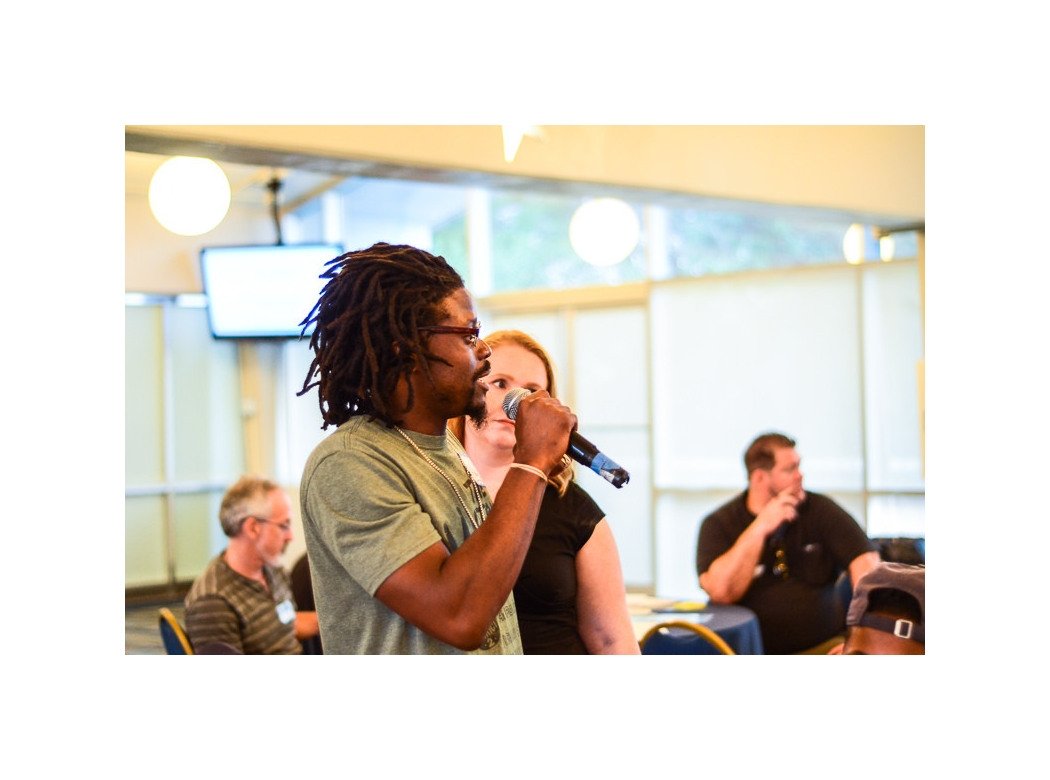News Voices to Work on Trust-Building with Local Media

Jonathan Cooper
We’re excited to announce that the News Integrity Initiative (NII) at the CUNY Graduate School of Journalism has chosen Free Press’ News Voices project as one of its first 10 grantees.
Free Press is honored to be among a remarkable group of organizations doing vital work to foster trust between newsrooms and the public and nurture constructive, inclusive public conversations. The $250,000 grant will help support News Voices’ work in North Carolina, where we launched earlier this year, and in New Jersey, where we’ve been working since 2015.
Fostering trust
News Voices builds bridges between journalists and everyday people to improve local news, increase access to credible information, and foster public support for quality journalism. We do that through intensive on-the-ground outreach and in-person conversations, large and small.
This grant will help us work with our local and state partners to leverage our local relationships and explore how communities lose trust in the media — and how to rebuild it.
As Molly de Aguiar told Nieman Lab about NII’s approach, “The flip side of disinformation is trust.”
That’s how we see it, too. Accuracy in news is necessary but not sufficient to building trust. If people don’t trust the news sources or the newsgathering process, they won’t trust the facts news sources present.
At News Voices, we believe the conversation about journalism’s future must include the people news outlets exist to serve. Building and repairing trust in news requires not only trustworthy facts, but trust-building practices.
People across the demographic and political spectra are angry at “The Media” for many different reasons.
We’ve heard that anger in some of the communities we’ve been working in, where people feel skeptical about the notion that journalism can be a positive force in their lives, or that it can help them make the change they wish to see. Sometimes these feelings emerge because newsrooms don’t reflect the people in the communities they serve, or because the stories don’t reflect people’s lives.
We hear many of the same complaints in rural North Carolina that we hear in urban New Jersey: that the TV trucks show up only when something terrible happens. That the stories that matter go uncovered and the questions that feel urgent go unasked. That no one is listening.
In news deserts where local news reporting is falling away, lack of coverage causes people to fill the void as best they can through ad hoc communication channels, like listservs, social media and word of mouth, that can easily devolve into speculation, rumor, misinformation and partisanship.
In urban communities of color, there’s an overload of crime news that misrepresents people’s lived experiences and creates an alarmist and racist narrative designed not for public service, but for media companies’ profit.
Starting two-way conversations
News Voices has been working to change these patterns of distrust by listening and engaging, and by inviting the people who feel poorly served to reshape how they interact with the news. Instead of proclaiming from the podium, journalists sit at the table to join the conversation.
By inviting reporters and other community members into a two-way conversation and elevating their voices, we’re building trust in new ways.
We help people better understand their agency and see themselves as constituents rather than consumers of journalism. Support from NII will help us continue to work with people in communities in North Carolina and New Jersey to see how we can build trust collaboratively.
We can’t do our work alone. That’s why it’s especially exciting to be among a list of terrific fellow grantees — many of whom we already count on and work with as allies — working on so many pieces of the trust problem.
Just to name a few:
Right in our backyard, EducationNC, a nonprofit news outlet that covers education issues across the state, will use its NII support to boost Reach NC Voices, a statewide project that uses simple, accessible technology to survey North Carolinians in real time to understand how they feel about the broad array of issues facing our students, parents, educators and communities.
These perspectives influence EducationNC’s reporting and analysis, which in turn influences state education-policy debates. We can’t wait to work together.
We’ve worked with the Center for Investigative Reporting’s Reveal Labs on the Dirty Little Secrets collaborative journalism project on toxic pollution in New Jersey, and we look forward to continued collaboration with them as they explore new ways community engagement can power investigative journalism.
The Listening Post Collective has been working with our allies Jersey Shore Hurricane News on two-way conversations with contributors and audiences. Our friends at the Coral Project have been studying, testing, designing and sharing open-source digital tools. We look to both of these partners to help us understand how newsrooms of all sizes in North Carolina and News Jersey can use technology to build community and draw on that community to inform their reporting.
The Maynard Institute works to improve the accurate representation of people and communities of color in the news and to diversify the media. We see firsthand how lack of newsroom diversity leads to distrust of the media, so we’re excited about the Maynard 200 initiative that will train, mentor and support journalism leaders, entrepreneurs and community storytellers over the next five years.
A full list of grantees appears here.